What is cardioversion?
Cardioversion is a medical procedure that uses electrical shocks to reset the heart's rhythm back to normal. Cardioversion can be used to treat both fast and slow heartbeat rhythms that are abnormal. Cardioversion is also sometimes called electrical cardioversion, or DC cardioversion. Cardioversion is not the same as defibrillation. Defibrillation uses a stronger shock to treat heart rhythm problems that are life-threatening.
Dr. Leandro Perez discusses cardioversion and how it corrects irregular heartbeats (arrhythmias) like Atrial Fibrillation (A-Fib).
Why is it done?
Cardioversion may be done to treat:
Supraventricular tachycardia (SVT)
Cardioversion is usually done when other treatments, such as medicines, have not worked. Cardioversion is also sometimes done as the first treatment for people who have had a fast or irregular heartbeat for a short time.
How to prepare for a cardioversion?
Your doctor will likely do a physical exam and ask about your medical history. You may also have tests, such as an electrocardiogram (EKG) or echocardiogram, to check your heart's health and rhythm.
You'll likely be asked to stop taking certain medicines, such as blood thinners, for a short time before the procedure.
You'll be given medicine to help you relax during the cardioversion. This medicine may be given through an IV in your arm. You may also be given general anesthesia, which will make you sleep during the procedure.
What can you expect during an electrical cardioversion?
Cardioversion is a medical procedure typically conducted in a hospital setting. A care provider will insert an IV into your forearm or hand and give you medications called a sedative to help you sleep during the procedure.
If you're having chemical cardioversion, you'll receive different medications through the IV that aim to restore your heart rhythm.
A physician or other healthcare professional places numerous large patches (known as sensors, or electrodes) on your chest and occasionally on your back during electrical cardioversion. The sensors are linked to a cardioversion machine via wires. To reestablish a normal heart rhythm, the equipment delivers fast, low-energy shocks to the heart.
Electric cardioversion is often a quick process, taking only minutes to finish.
After the treatment
After the treatment is over, the care team will monitor your heart rhythm and vital signs. You'll likely stay in the hospital for a few hours after electrical cardioversion so your care team can make sure your heart is functioning normally.
To request an appointment click below or call (239) 300–0586


